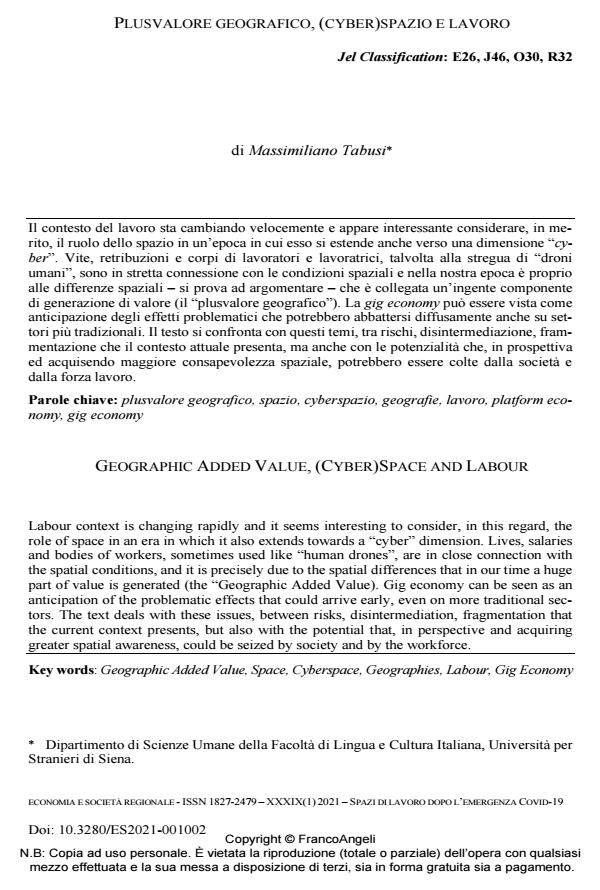Plusvalore geografico, (cyber)spazio e lavoro
Titolo Rivista ECONOMIA E SOCIETÀ REGIONALE
Autori/Curatori Massimiliano Tabusi
Anno di pubblicazione 2021 Fascicolo 2021/1
Lingua Italiano Numero pagine 17 P. 13-29 Dimensione file 270 KB
DOI 10.3280/ES2021-001002
Il DOI è il codice a barre della proprietà intellettuale: per saperne di più
clicca qui
Qui sotto puoi vedere in anteprima la prima pagina di questo articolo.
Se questo articolo ti interessa, lo puoi acquistare (e scaricare in formato pdf) seguendo le facili indicazioni per acquistare il download credit. Acquista Download Credits per scaricare questo Articolo in formato PDF

FrancoAngeli è membro della Publishers International Linking Association, Inc (PILA), associazione indipendente e non profit per facilitare (attraverso i servizi tecnologici implementati da CrossRef.org) l’accesso degli studiosi ai contenuti digitali nelle pubblicazioni professionali e scientifiche.
Il contesto del lavoro sta cambiando velocemente e appare interessante considerare, in merito, il ruolo dello spazio in un’epoca in cui esso si estende anche verso una dimensione "cyber". Vite, retribuzioni e corpi di lavoratori e lavoratrici, talvolta alla stregua di "droni umani", sono in stretta connessione con le condizioni spaziali e nella nostra epoca è proprio alle differenze spaziali - si prova ad argomentare - che è collegata un’ingente componente di generazione di valore (il "plusvalore geografico"). La gig economy può essere vista come anticipazione degli effetti problematici che potrebbero abbattersi diffusamente anche su settori più tradizionali. Il testo si confronta con questi temi, tra rischi, disintermediazione, frammentazione che il conte-sto attuale presenta, ma anche con le potenzialità che, in prospettiva ed acquisendo maggiore consapevolezza spaziale, potrebbero essere colte dalla società e dalla forza lavoro.
Parole chiave:Plusvalore geografico, spazio, cyberspazio, geografie, lavoro, platform eco-nomy, gig economy
Jel codes:E26, J46, O30, R32
Massimiliano Tabusi, Plusvalore geografico, (cyber)spazio e lavoro in "ECONOMIA E SOCIETÀ REGIONALE " 1/2021, pp 13-29, DOI: 10.3280/ES2021-001002